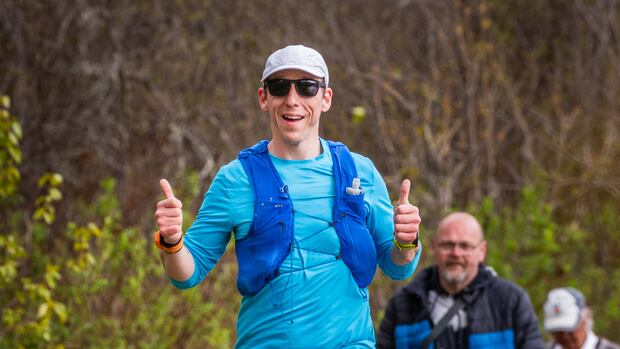Preston Schaffer didn’t consider himself a runner until four years ago.
Now, the 39-year-old Regina massage therapist competes in backyard ultra marathons that can last for days.
Unlike a traditional race, where you run a set distance as fast as possible, a backyard ultra marathon requires runners to complete the same 6.7-kilometre loop every hour, on the hour, until only one runner remains. The race is about endurance and balance. If a runner goes too hard, they’ll burn out early.
The record is 108 hours, for a total distance of 724 kilometres.
In August, Preston earned a spot on the Canadian national team by winning the Grassroots Ultra in Okotoks, Alta., with 35 laps totalling 234.7 kilometres.
His first secret to success?
“My wife tells me that I have to keep running, and I listen to my wife. I’m a smart husband,” he joked.
His wife Kristen, a teacher, is his crew captain.
Just. Keep. Going.
Preston ran his first half-marathon in 2022, then jumped straight to ultra marathons.
“It’s kind of funny for me, because my joke is I’ve never actually done a real marathon,” he said.
A traditional marathon is roughly 42 kilometres. In Preston’s first backyard ultra, he ran 21 laps for a total of 140 kilometres.
“I woke up the next day, or the day afterwards, and thought to myself, ‘I could have went further. I could have went longer,'” he said. “I think that’s why backyard ultra speaks to me, because I typically want to see how far I can go, before I can’t.”
Preston Schaffer is on Canada’s Backyard Ultra Marathon national team, which will be seeking a world championship on Oct. 19.
Preston is part of a 15-member Canadian team that will compete against 63 other countries at the Big Backyard Ultra World Team championship starting Oct. 19. No one knows how long the race will last. Each country hosts their own event on home soil — the Canadian event is in Edmundston, N.B. — and the athletes score points for their country while vying to win the local race.
While Preston’s running journey has been relatively short, he’s already learned what helps him succeed.

He said he doesn’t think anyone can be successful at long-distance endurance races without the support of family and friends. He and his wife fit in training and marathons around four kids and seven pets, including two dogs, three cats and two guinea pigs.
During races, Kristen keeps track of her husband’s pace, nutrition, shoes and even, if he has enough time between laps, his sleep.
“By nap, I mean it might be a minute or two, maybe five minutes tops, and that depends on whether he needs a shoe change or something more involved when he comes into that pit stop,” Kristen said.
Preston changes his shoes every three or four hours because the cushioning becomes too compressed. His preferred meals during the race include mashed potatoes with butter and salt, perogies, crackers and all-dressed chips.

Besides food, Preston has another secret for boosting his energy: he smiles.
He loves telling dad jokes on the trail.
“I enjoy just being goofy when I run because there’s a saying that goes, ‘When you smile while you’re running, you can feel the pain less, in a sense, or you can endure longer,'” he said.
Preston’s positive vibes could help his teammates in the world championship, too.
Backyard ultra marathons have a rule stating the last runner can only run one more loop after the second-to-last runner — known as “the assist” — stops. Runners who want to set a record need the assist to keep going, too. In the Team Worlds event, where countries compete for total laps, the Canadians will be cheering each other on.
Mental game
Preston also sets goals and stays focused on keeping going.
“In my opinion, people can go much further than what they think they are physically capable of,” he said. “So, to be straightforward, I think it’s more mental game the longer it goes. The stronger your mental capability is, the stronger you can mentally convince yourself you can keep going.”

Kristen said it’s remarkable how far her husband is able to push his body.
“We haven’t quite made it to the race that has actually broken him. He’s always been pretty strong physically and his mental game has never cracked yet. I’m still kind of intrigued whether we’ll ever reach that point.”











